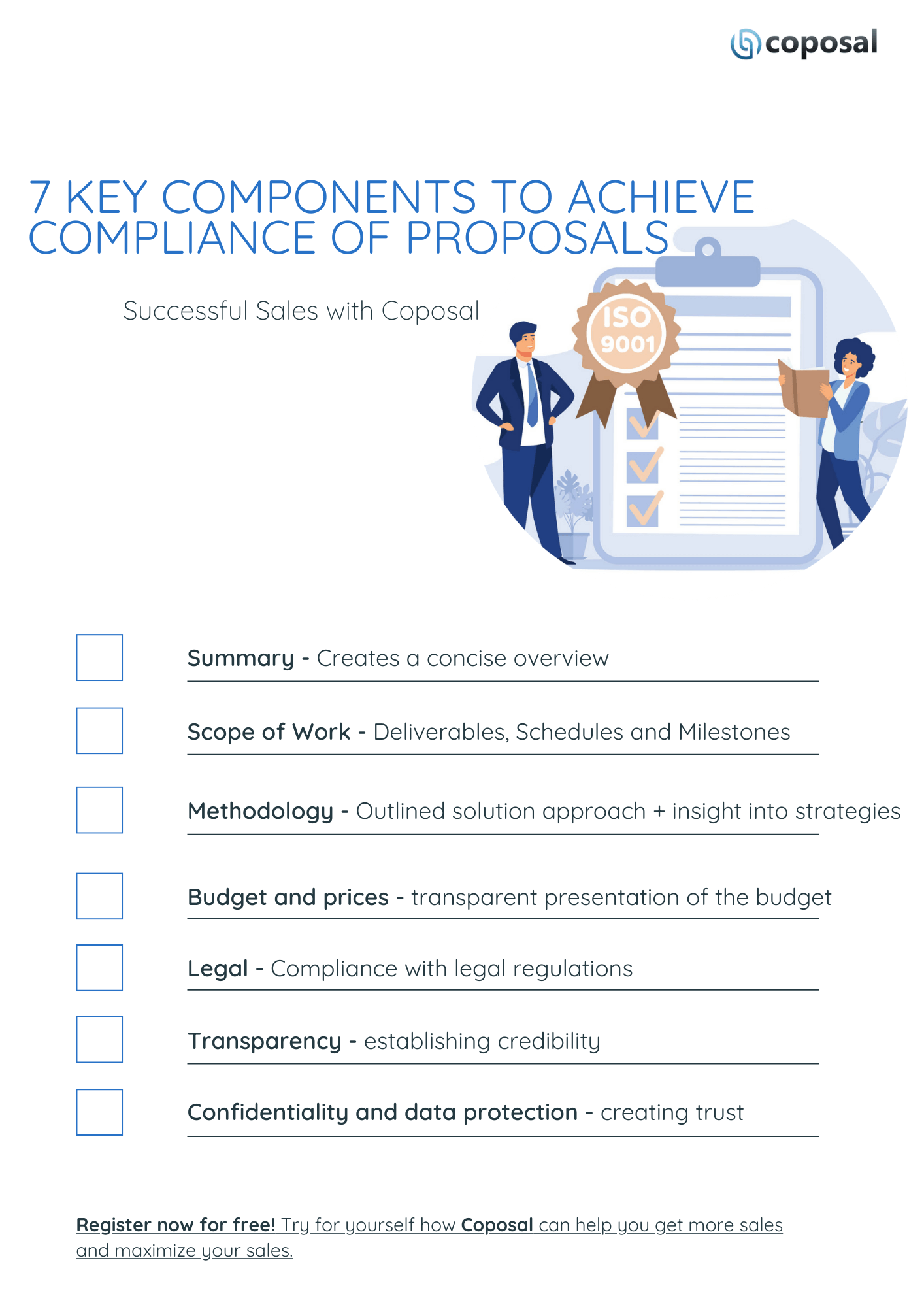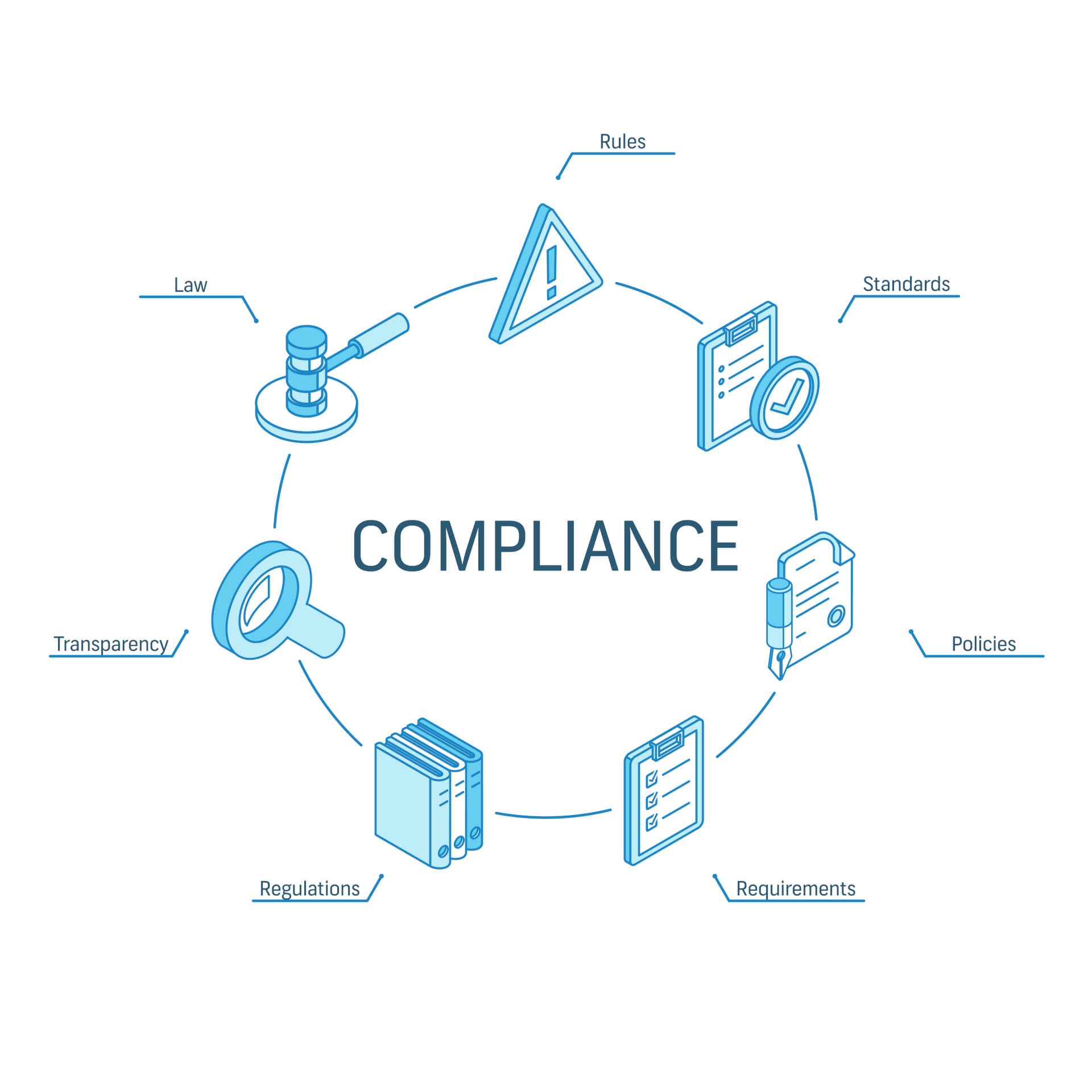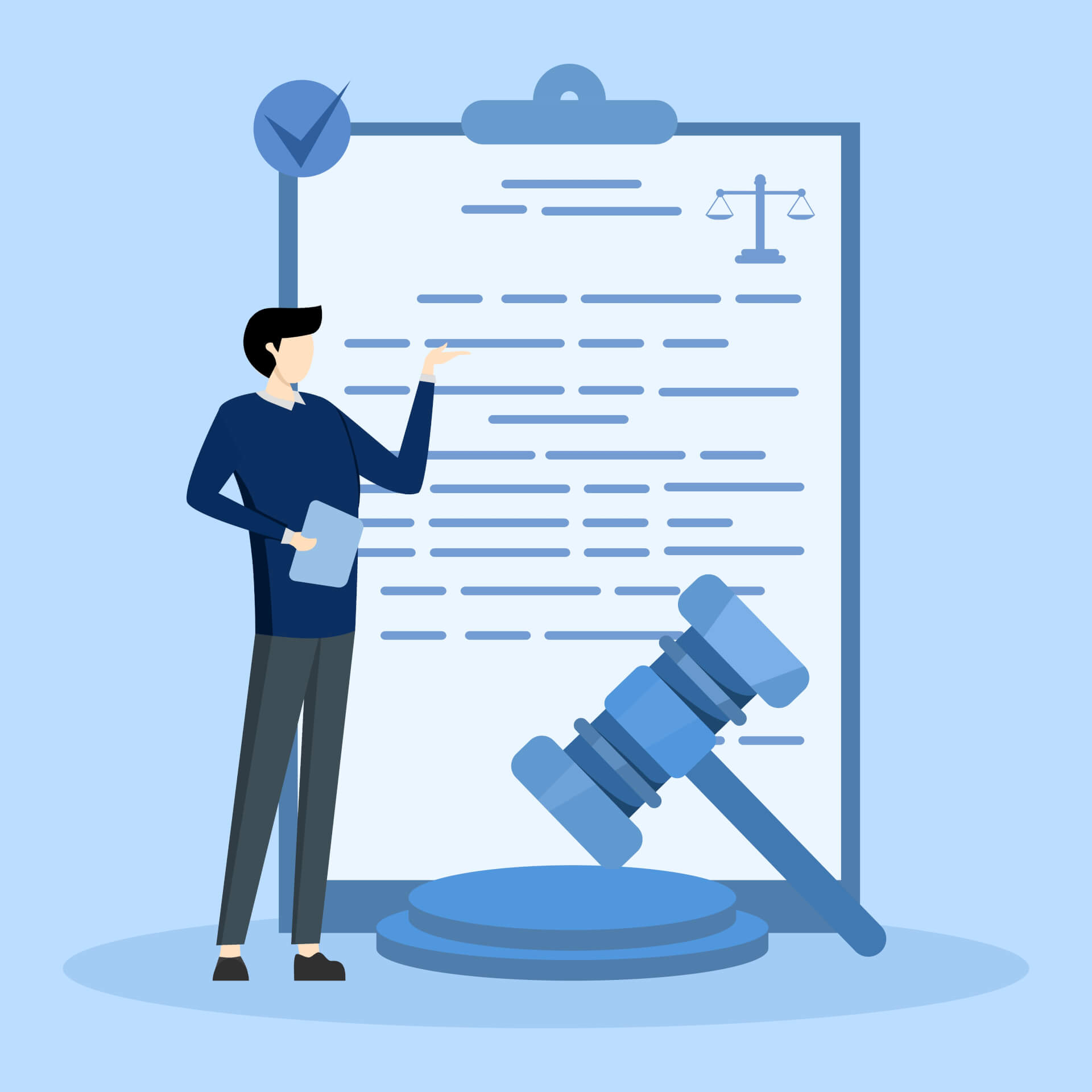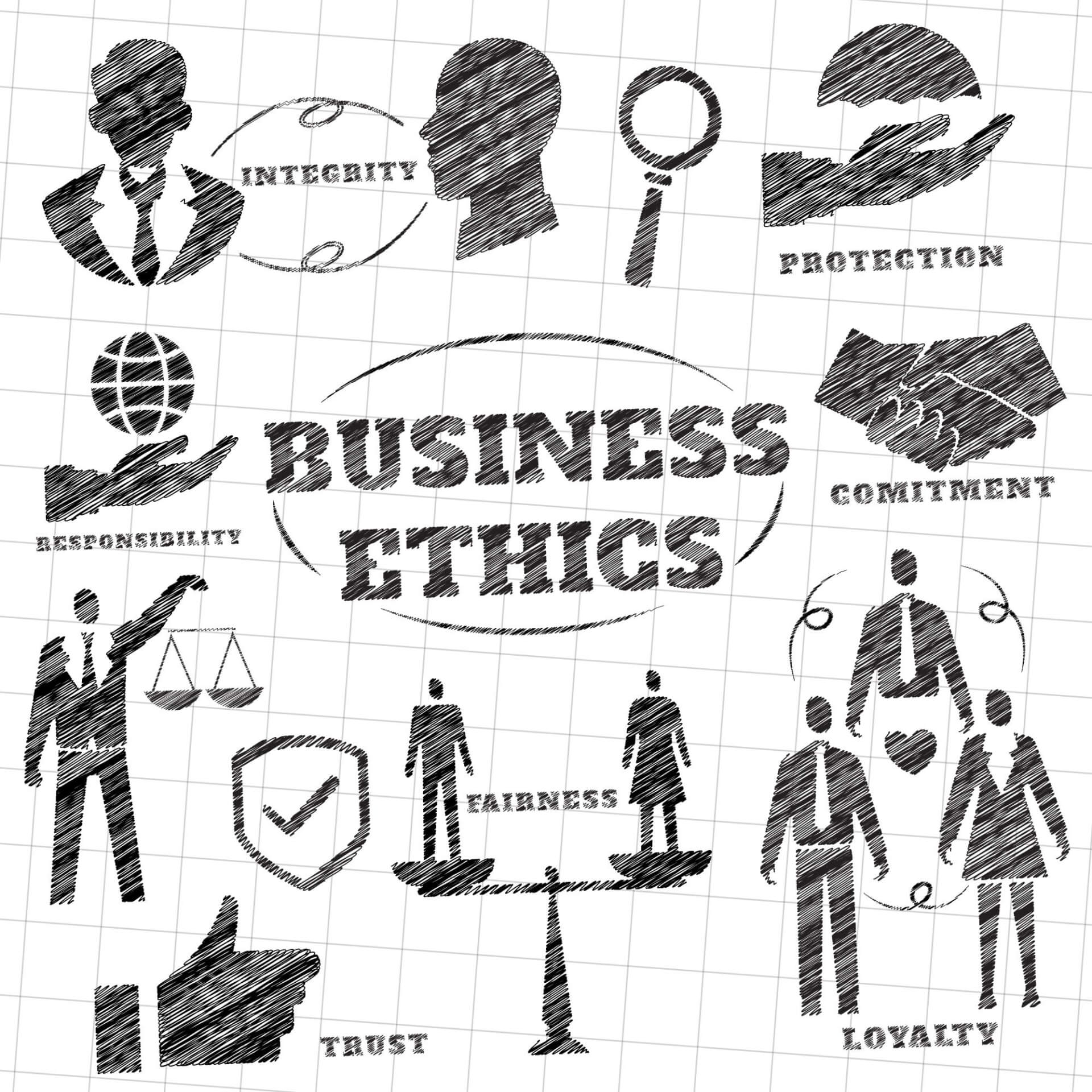 In the business sector, proposals serve as important documents in which plans, solutions, or proposals for potential customers or partners are outlined.
In the business sector, proposals serve as important documents in which plans, solutions, or proposals for potential customers or partners are outlined.
However, simply drafting a proposal is not enough; equally important is the compliance with various standards and requirements.
In this article, we discuss the basic components and offer insights and strategies to ensure success.
Table of Contents
Why Compliance is Important.
 In today's highly regulated business environment, compliance, or more specifically, industry conformity, is of utmost importance.
In today's highly regulated business environment, compliance, or more specifically, industry conformity, is of utmost importance.
It ensures compliance with legal, ethical, and industry-specific standards and protects both the organization and its stakeholders from potential risks and liabilities.
Compliant proposals mean alignment with customer expectations, contractual obligations, and regulatory requirements, fostering trust and credibility.
Proposal Compliance - More than Guidelines
Compliance with standardized processes and elements in your proposals goes beyond mere formality.
It reflects the organization's commitment to professionalism, integrity, and quality.
Companies demonstrate their ability to deliver promised services, foster positive relationships, and enhance their market reputation.
Compliant Proposals - Content and Structure
 A well-crafted proposal serves as the basis for creating industry-compliant proposals.
A well-crafted proposal serves as the basis for creating industry-compliant proposals.
It should be clear, concise, and comprehensive, effectively addressing the needs and expectations of the customer.
When preparing your proposal, pay attention to the key components that every proposal should include to be compliant across industries:
1 - Summary
The summary provides a concise overview of the proposal and highlights its key aspects and value proposition.
It should capture the reader's attention and convey the core of the proposal in a compelling way.
2 - Scope of Work
Clearly define the scope of work to be performed, including the services, timelines, and milestones to be delivered.
Ensure that the proposed scope aligns with the customer's requirements to avoid misunderstandings or discrepancies later on.
3 - Methodology
Outline the approach or proposed methodology to address the customer's needs or challenges.
Provide insights into the strategies, tools, and resources to be used to achieve the desired results.
4 - Budget and Pricing
Transparently present the proposed budget, including costs for labor, materials, and any additional expenses.
Ensure that the pricing structure is competitive yet profitable, reflecting the value offered to the customer.
Utilizing Technology for Compliance
In addition to content and structural requirements, technology plays a crucial role in proposal management.
The use of advanced software solutions and tools can streamline the proposal development process, increase accuracy, and ensure consistency.
Here are some ways technology can be used for proposal compliance:

Proposal Management Software
Invest in robust proposal management software that enables central document storage, version control, and collaboration among team members.
Such tools automate repetitive tasks, minimize errors, and expedite the review and approval process of proposals.
Compliance Checklists and Templates
Develop standardized compliance checklists and templates tailored to different types of proposals and industries.
These resources serve as invaluable guides and ensure that all required components are included and requirements are consistently met.
Data Analysis and Insights
Harness the power of data analysis to gain actionable insights on proposal performance, customer preferences, and market trends.
Analyzing past proposal outcomes can serve as a basis for future strategies and enhance the company's competitive advantage.
Compliance with Legal and Regulatory Requirements
In addition to meeting customer-specific requirements, proposals must also comply with relevant legal and regulatory standards.
Non-compliance with applicable laws and regulations can lead to legal consequences and reputational damage for the organization.
Here are some steps to ensure compliance with legal and regulatory requirements:

Conducting Due Diligence
Thoroughly research and understand the legal and regulatory framework governing the proposed project or contract.
Identify any legal requirements or restrictions that may impact the execution of the proposal and take appropriate measures to address them.
This ensures that you have acted with "due diligence."
Consultation with Legal Experts
Engage legal experts or consultants with expertise in relevant legal areas to review and validate the compliance status of the proposal.
Seek their opinions on contract terms, liability provisions, intellectual property rights, and other legal considerations.
Documentation and Records
Maintain meticulous documentation throughout the proposal development process, including correspondence, contracts, and approvals.
Establish sound record-keeping practices to demonstrate compliance with legal and regulatory requirements and provide audit trails when needed.
Consideration of Ethical Considerations
Ethical considerations are an essential part of proposal development and compliance.
Adhering to ethical standards and principles not only promotes trust and integrity but also mitigates reputation risks and strengthens stakeholder confidence.
Here are some ethical considerations to keep in mind:

Transparency and Honesty
Be transparent and honest in all communications and representations made in the context of the proposal. Avoid exaggerations or misrepresentations that could undermine credibility and trustworthiness.
Confidentiality and Data Protection
Respect the confidentiality of the customer and adhere to data protection regulations when handling sensitive information or protected data.
Implement robust security measures to protect against unauthorized access or disclosure.
Conflict of Interest Management
Disclose any potential conflicts of interest that may arise during the course of the proposed engagement and outline measures to address them ethically.
Maintaining impartiality and objectivity is essential for preserving the integrity of the proposal process.
Summary
By focusing on the key components described in this article and utilizing technology-driven solutions, companies can improve their proposal development process, mitigate risks, and maximize their chances of success.
Remember, compliance is not just a checkbox. It is a commitment to excellence and integrity in every aspect of business operations.
 Reading Tip: If our article has helped you and you want to learn more about mandatory disclosures and legal requirements in proposals, continue reading here: "Tips for Writing Successful Proposals"
Reading Tip: If our article has helped you and you want to learn more about mandatory disclosures and legal requirements in proposals, continue reading here: "Tips for Writing Successful Proposals"
Frequently Asked Questions about Proposal Compliance
How can I ensure compliance with customer-specific requirements in my proposals?
To ensure compliance with customer-specific requirements, carefully review the proposal guidelines provided by the customer and align your proposal accordingly. Adjust your approach, deliverables, and timelines to effectively meet the customer's expectations.
What role does risk management play in proposal compliance?
Risk management is crucial for identifying and mitigating potential risks or uncertainties associated with the proposed project.
By proactively addressing risks in the proposal, you demonstrate readiness and build trust with the customer.
Why is transparency important in proposal development?
Transparency promotes trust and credibility in the proposal process, enabling open communication and honest representation of capabilities and results.
Avoiding misleading or fraudulent practices is crucial for upholding ethical standards.
How can technology facilitate compliance with proposal guidelines?
Technologies like proposal management software and data analysis tools can streamline the proposal development process, increase accuracy, and provide valuable insights for optimizing proposal strategies.
What legal aspects should I consider when drafting proposals?
When drafting proposals, it is important to consider legal requirements related to contracts, intellectual property rights, liability provisions, and compliance with legal regulations. Consulting legal experts can help ensure compliance with regulations and mitigate legal risks.
How can I uphold ethical standards in proposal development?
Adhering to ethical standards requires transparency, honesty, confidentiality, and addressing conflicts of interest.
By adhering to ethical principles throughout the proposal process, you demonstrate integrity and professionalism.